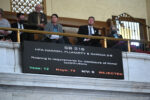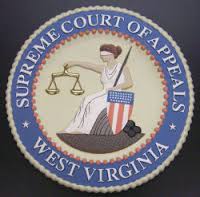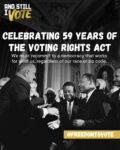Yesterday, the WV Supreme Court of Appeals heard arguments from lawyers representing Justice Brent Benjamin and attorney Bill Wooton asking that the Court uphold the State Election Commission’s (SEC) decision to award them public financing. Earlier this month, two Kanawha County circuit court judges disagreed with the SEC’s decision to award public financing to the two candidates. Benjamin and Wooton then appealed the circuit court decisions to the Supreme Court. Because all five justices voluntarily recused themselves from the cases, a panel of senior status and circuit court judges heard the arguments after reviewing the parties’ written briefs.
In early February, the Commission certified both candidates to receive public campaign financing (read more here and here) despite objections from Beth Walker, who is challenging them in this year’s race for the WV Supreme Court of Appeals. Former Justice and state Attorney General Darrell McGraw and Clay attorney Wayne King are also running for the seat currently held by Benjamin.
The basis of Walker’s initial challenges and appeals of the SEC’s decisions in favor of Benjamin and Walker were technical in nature. The Walker campaign contended that Wooton filed his application for certification with the Commission a day late and appealed the SEC’s decision in Kanawha County Circuit Court. Walker’s appeal claimed Wooton should be disqualified from receiving public financing based on his failure to meet the deadline for filing his Application for Certification with the Commission. Walker also appealed Benjamin’s certification after the SEC rejected her challenges to more than 500 individual donors who made qualifying contributions to Benjamin’s campaign.
However, the temporary panel of judges agreed with attorneys for the participating candidates that the Commission was right to base its decisions on substance and the fact that Benjamin and Wooton met the requirements necessary to qualify for public financing rather than on procedural technicalities (read more here and here).
This means both candidates get to keep their public financing, which is good news. We shared concerns expressed previously by at least one SEC member that the decision could have a chilling effect on future participation in the program if Benjamin and Wooton were denied public financing.
We’ll continue to keep you posted on any developments related to the future of the public financing program. In the meantime, to learn more about the candidates, their judicial philosophies, and their positions on public financing of Supreme Court elections, an intermediate court of appeals and West Virginia’s judicial reputation check out their recent meeting with the editors of the Charleston Gazette-Mail.











